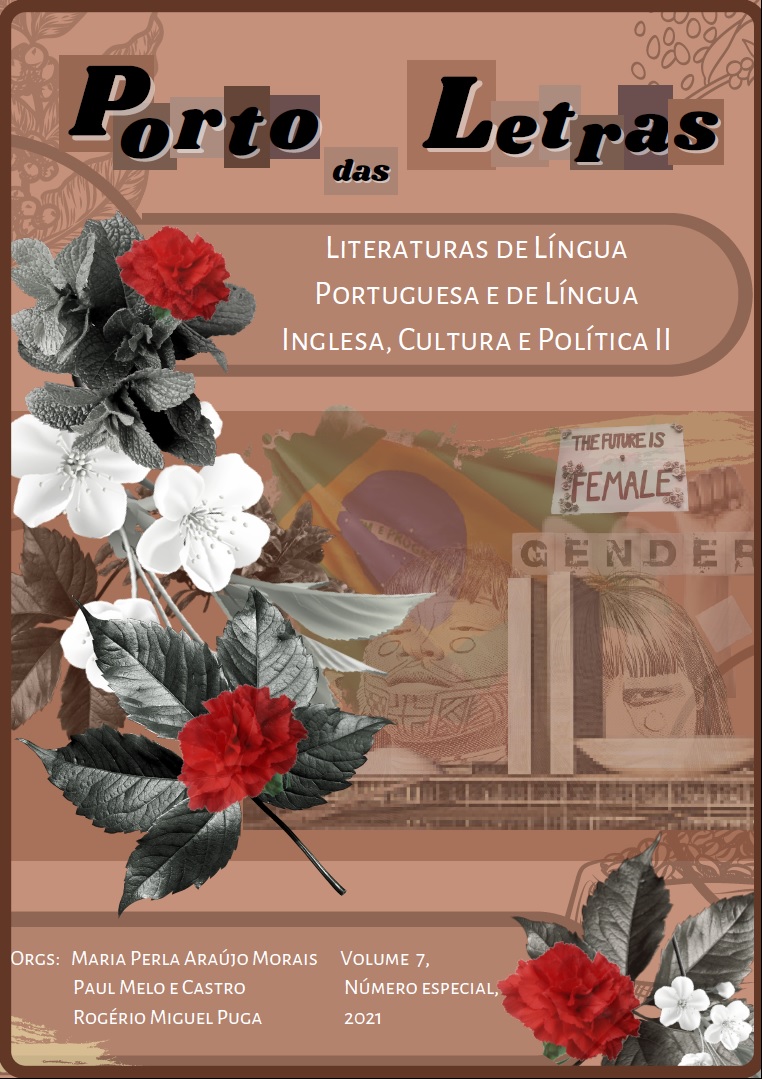LITERATURA, POLÍTICA E REALIDADE SOCIAL
a função social do Estado moderno brasileiro em tempos de crise
Palabras clave:
Nacionalismo; Estado; Literatura; Resistência.Resumen
O presente artigo tem por objetivo, a partir da literatura pré-moderna brasileira, da análise do discurso de filiação pecheutiana, do materialismo histórico-dialético e da realidade política do Brasil - em meio ao golpe jurídico-parlamentar de 2016, refletir sobre a função social do Estado moderno brasileiro com seu discurso nacionalista em tempos de crise econômica e social, bem como sobre as possibilidades de resistência a esse discurso para a construção de um horizonte societário que resista e supere o atual sistema antagônico de produção e reprodução das relações sociais do povo brasileiro. Aponta-se, como resultado central da reflexão, que a verdadeira função social do Estado moderno é garantir a manutenção do status quo da sociedade do capital, tornando-se a garantia do êxito de um grupo de indivíduos em relação aos demais, da exploração econômica, perversa e cruel de um homem sobre outro, e que, no caso brasileiro, apela-se ao discurso nacionalista para que esse processo de expropriação aconteça harmonicamente. Nesse sentido, a pesquisa também apresenta como resultado que a literatura, a cultura e a arte decerto não são a solução imediata para a crise econômica, política e social que acompanha o Brasil da Monarquia à República, mas certamente podem intervir enquanto elementos potenciais de mediação para a construção do verdadeiro tipo nacional, tendo em vista a elaboração de um projeto de resistência ao pseudonacionalismo estatal brasileiro.
Citas
BARRETO, Lima. Triste fim de Policarpo Quaresma. São Paulo: Scipione, 1998.
BARRETO, Lima. Os Bruzundangas. Curitiba: Positivo, 2005.
CELSO, Affonso. Porque me ufano do meu paiz. 8ª ed. Rio de Janeiro: Livraria Garnier, 1968.
COUTO, Ronaldo Costa. História indiscreta da ditadura e da abertura: Brasil: 1964-1985. Rio de Janeiro: Record, 1998.
CUNHA, Euclides da. Os Sertões (Campanha de Canudos). Porto Alegre: L & PM, 2019.
FRANÇA, Antônio Queiroz de; RINARÉ, Rouxinol. António Conselheiro e a Guerra de Canudos. Série Heróis e mitos brasileiros. Fortaleza: Tupynanquim editora, 2006.
HOLANDA, Sérgio Buarque de. Raízes do Brasil. 26 ed. São Paulo; Companhia das Letras, 1995.
HERBERT, Thomas. Reflexões sobre a situação teórica das ciências sociais e, especialmente, da psicologia social. Tradução: Maria Vieira da Silva e Laura A. Perrela Parisi. In: PÊCHEUX, Michel. Análise de Discurso: Michel Pêcheux. Textos escolhidos por: Eni pulccinelli Orlandi. 4. ed. Campinas: Pontes Editores, 2015.
MAGALHÃES, Belmira. O sujeito do discurso: um diálogo possível e necessário. Linguagem em (Dis)curso, Tubarão, v. 3, Número Especial, p. 73-90, 2003. Disponível em: http://www.portaldeperiodicos.unisul.br/index.php/Linguagem_Discurso/article/view/247. Acesso: 15 jun. 2017.
MARX, Karl. Marx sobre Feuerbach (1845) [Com alterações de Engels, 1888]. Tradução: Rubens Enderle, Nélio Schneider e Luciano Cavini Martorano In: MARX, Karl; ENGELS, Friedrich. A ideologia alemã: crítica da mais recente filosofia alemã em seus representantes Feuerbach, B. Bauer e Stirner, e do socialismo alemão em seus diferentes profetas (1845-1846). São Paulo: Boitempo, 2007.
MARX, Karl. Crítica da Filosofia do Direito de Hegel. Tradução: Zur Kritik der hegelschen Rechtsphilosophie 2. ed. São Paulo: Boitempo, 2010a.
MARX, Karl. Glosas Críticas marginais ao artigo “O rei da Prússia e a reforma social”: de um prussiano. Tradução: Ivo Tonet São Paulo: Expressão Popular, 2010b.
MARX, Karl. Manuscritos econômico-filosófico. Tradução: Jesus Ranieri São Paulo: Boitempo, 2010c.
MARX, Karl. O 18 Brumário de Luís Bonaparte. Tradução: Nélio Schneider São Paulo: Boitempo, 2011.
MARX; ENGELS, Friedrich. Manifesto Comunista. Tradução: Álvaro Pina. São Paulo: Boitempo, 2007.
MELO NETO, João Cabral de. Morte e vida Severina. Rio de Janeiro: Alfaguara, 2007.
MÉSZÁROS, István. A crise estrutural do capital. Tradução de Francisco Raul Cornejo et al 2.ed. São Paulo: Boitempo, 2011a.
MÉSZÁROS, István. Como poderia o Estado fenecer. Tradução de Paulo Cezar castanheira e Sérgio Lessa In: MÉSZÁROS, István. Para além do capital: rumo a uma teoria da transição. São Paulo: Boitempo, 2011b.
MORIN, Edgar. O método 5: a humanidade da humanidade. Tradução: Juremir Machado da Silva. 3. ed. Porto Alegre: Sulina 2005.
PÊCHEUX, Michel. Análise automática do discurso (AAD-69). Tradução: Bethania S. Mariani. In: GADET, Françoise; HAK, Tony (Org.). Por uma análise automática do discurso: uma introdução à obra de Michel Pêcheux. 5. ed. Campinas, São Paulo: Editora da Unicamp, 2014a.
PÊCHEUX, Michel. Só há causa daquilo que falha ou o inverno político francês: início de uma retificação. Tradução: Eni Puccinelli Orlandi et al. In: PÊCHEUX, Michel. Semântica e discurso: uma crítica à afirmação do óbvio. Campinas: Editora da UNICAMP, 2014b.
PÊCHEUX, Michel. Papel da Memória. Tradução: José Horta Nunes. In: ACHARD, Pierre et al. Papel da Memória. 4. ed. Campinas, SP: Pontes Editores, 2015.
SANTOS, Lavoisier Almeida dos. A ideologia ufanista do governo ditatorial de Médici: em uma perspectiva marxista. São Paulo: Biblioteca 24x7, 2009.
TONET, Ivo. Educação, cidadania e emancipação humana. Ijuí: Unijuí, 2005.
Descargas
Publicado
Cómo citar
Número
Sección
Licencia
Os autores concordam com os termos da Declaração de Direito Autoral, que se aplicará a esta submissão caso seja publicada nesta revista (comentários ao editor podem ser incluídos a seguir).

